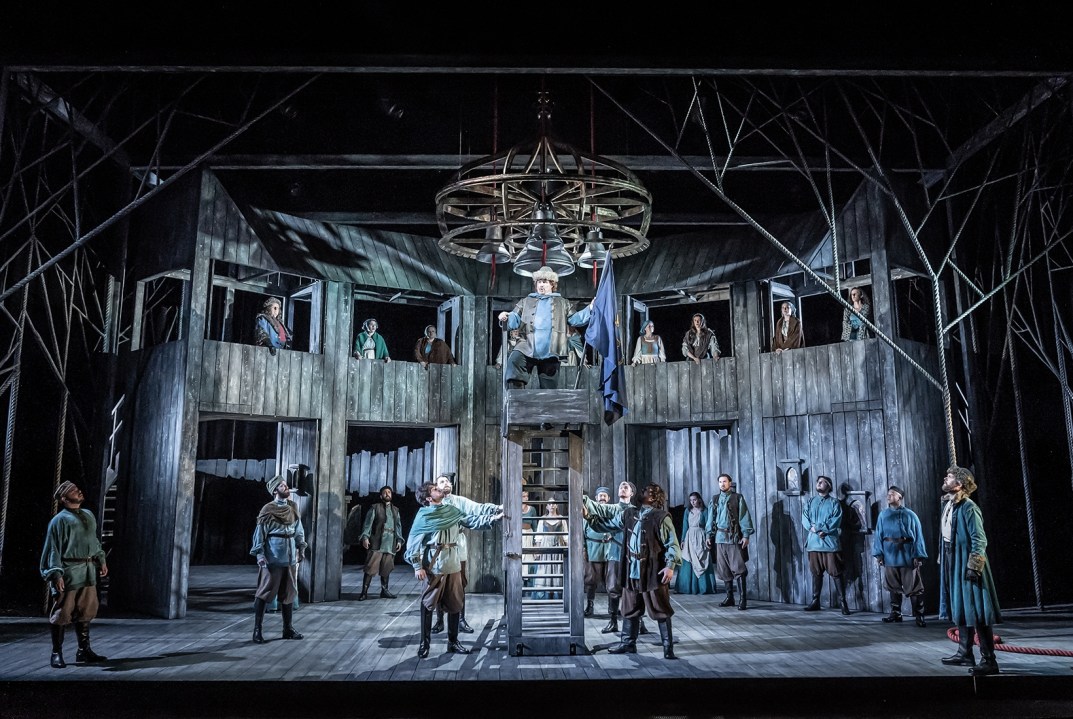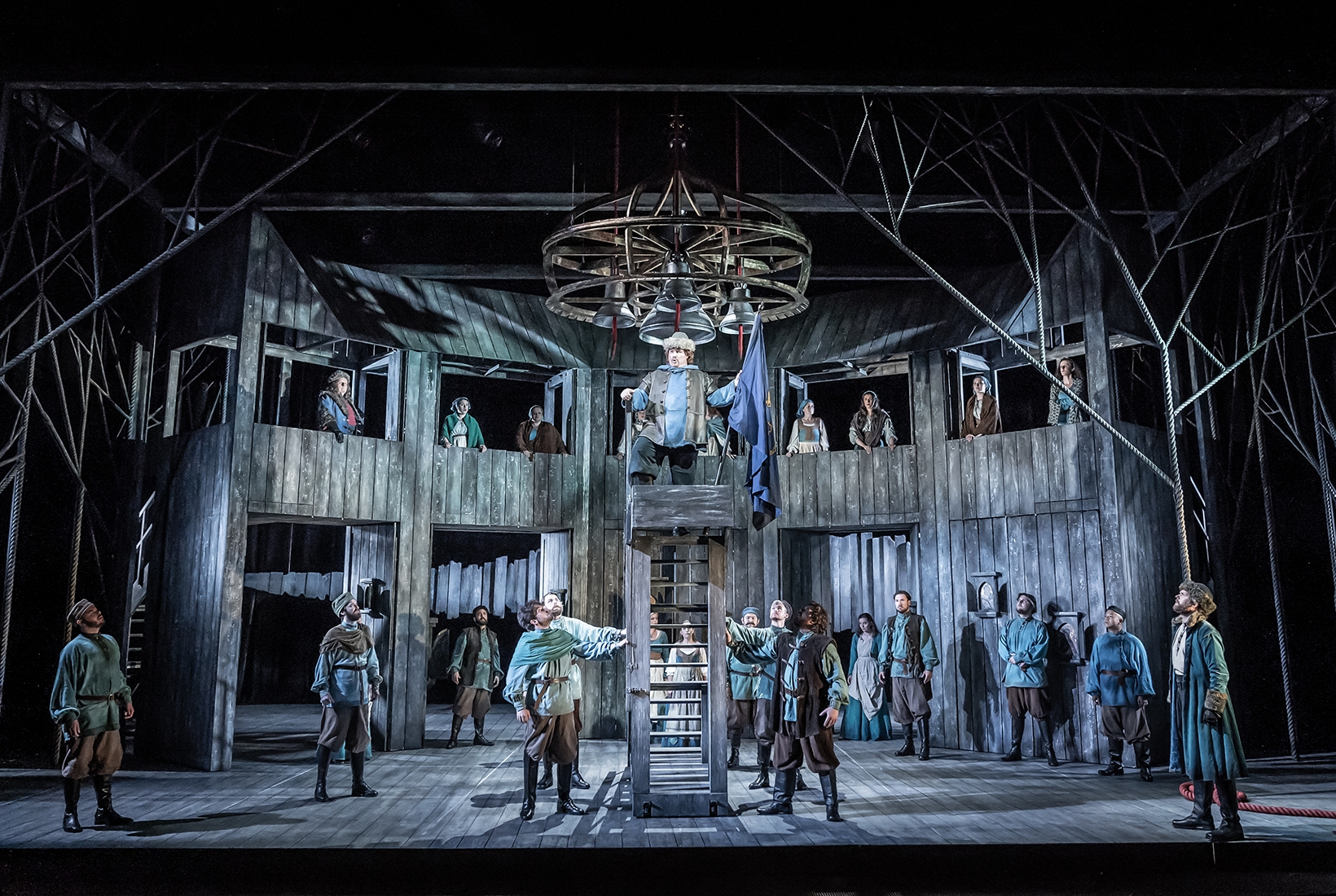There are worse inconveniences than having to wear a face mask to the opera. But there’s one consequence that hadn’t really struck home until an hour into Rimsky-Korsakov’s Ivan the Terrible. The citizens of Pskov are massing in the streets. The Tsar’s army is approaching, and Rimsky is building one of those surging Russian crowd scenes: bass-heavy chorus blazing away while ominous bell sounds — basses, horns and rasping gong — shake the orchestra to its bones. Suddenly a bloodstained figure staggers in and collapses; a refugee from nearby Novgorod. ‘Your brother-city sends its greetings, and asks you to arrange its funeral,’ he gasps. At that point, I’d have given quite a lot to have been able to lean over to my companion and silently mouth just four words — wow, this is good.
Cards on the table: I’m more likely to shed tears at Don Carlos than La traviata, and I fidget impatiently through the Falstaff bits in Henry IV. Enough with the smiley-weepie stuff, let’s get back to the power-politics! Russian opera gets a bad rap in the West precisely because of its association with national history and myth, and Ivan the Terrible hasn’t had many outings in the UK since Diaghilev last presented it in London in 1914. Like Borodin’s Prince Igor and Mussorgsky’s Khovanshchina, it exists in a tangle of different editions and configurations, less a fully achieved masterpiece than a kit of parts for one. The problem being that those disjointed components contain some truly soul-shaking music.
For all its flaws Ivan the Terrible contains far too much greatness to be ignored for another 107 years
David Pountney has seized that problem by the scruff. He’s added Rimsky’s standalone prologue Boyarin Vera Sheloga, making this effectively a double bill, and extending the first half to nearly two hours. No grumbles here: the action, played out beneath the wooden walls of the medieval city, delivers enough of those nudge-your-neighbour moments to hold the attention, and the performances were as red-blooded as the plot. Evelina Dobracheva’s soprano gave a steely bite to the mental anguish of the heroine Olga, while the highest compliment I can give to Carl Tanner as her rebellious sweetheart Tucha, and David Shipley (a real clarion of a bass) as her father, is that I initially assumed that they, too, were Russian. Mikhail Tatarnikov, conducting, drove the orchestra forward earthily — as rough-cut and pungent as black bread and kvass. The chorus was ferocious.
So assuming you’re not unduly invested in Rimsky’s sketchy romantic subplot, there’s only one really major problem. It’s the title role; not Clive Bayley’s magnificently cavernous, oily singing as the vengeful Tsar, so much as Pountney’s decision to portray him as Stalin — literally Stalin, complete with uniform and jackboots. The whole (shortish) second half has jumped forward into the 1940s, and Bayley is brilliant at projecting an unpredictable repressed menace. You think of those stories of Stalin phoning Bulgakov at midnight for a friendly comrade-to-comrade chat, and shudder.
But in an opera whose plot needs all the help it can get, this sudden leap into History Channel documentary imposes an unnecessary layer of meaning to decode. Was the medieval first act an allegory? (It’s implied at one point that it might have been an Eisenstein-style cinema epic.) It doesn’t help that Bayley’s Uncle Joe moustache-and-eyebrow combo suggests entirely the wrong Marx — Groucho, not Karl. Banish those sniggers, though — to Siberia, if necessary. Rimsky’s haunted Ivan is a compelling figure (again, Don Carlos comes to mind; like Verdi’s Philip II, you wanted more of him) and the production as a whole makes heroic efforts on behalf of an opera that, for all its flaws, contains far too much greatness to be ignored for another 107 years.
Rossini’s La Cenerentola is rather more conducive to the consumption of Waitrose fizz, and Stephen Barlow’s witty new production at the Grange Festival is set in a pastel-coloured 1950s USA. Cinderella and her sisters are Italian-American trailer trash and Don Ramiro (Nico Darmanin) is a cocktail-bar crooner. The nice thing was just how responsively the cast played off each other, with Heather Lowe, as Angelina, singing with a tenderness that gave the whole show the conversational warmth of a chamber piece —no small achievement for an opera that contains some of the frothiest vocal writing of a very frothy era, in a staging that flashes the moral of the tale in pink neon letters.
Unable to fit an orchestra into the pit under current restrictions, The Grange uses a pre-recorded soundtrack by the Bournemouth Symphony Orchestra. The result is pure uncanny valley, with a curiously listless quality and a glossy, over-resonant finish that sounds like no pit band on earth. Depressingly, the ear soon acclimatises. It’d be unfair to describe the cast’s sparky performances as high-end karaoke; this was a sincere attempt to solve a real problem, and I’m pleased to have heard it. I hope I never hear it again.







Comments